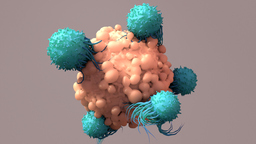Protein Biomarkers for Detection and Prediction of Cytokine Release Syndrome and Neurotoxicity during CAR T Cell Therapy
TECHNOLOGY NUMBER: 2021-417

OVERVIEW
Novel biomarkers that predict risks for toxicity in patients undergoing CAR-T cancer treatments- Serum evaluations of neutrophil counts as well as two specific proteins define side effect risks
- Continuous temperature monitoring of CAR-T patients heralds upcoming side effect events
BACKGROUND
Effective adoptive T cell therapy involves the targeting of cancer cells through the use of transferred T cells, with the main approach being chimeric antigen receptor T cell (CAR-T) therapy. CAR-T involves recovery of T cells from a cancer patient’s blood, genetically modifying the gene for the specific chimeric antigen receptor, and then placing them back into the patient where the newly developed CAR-T cells bind to target cell surface antigens. CAR-T therapies are being developed for a wide range of cancer types, and they have shown particular usefulness in heavily treated, relapsed patients with acute leukemia, lymphoma, and multiple myeloma. A major limiting factor for CAR-T therapy is toxicity due to over-activation of the host's innate immune system which occurs in over 70% of treated patients and causes ICU admission in up to 30%. This side effect profile limits which patients can be considered for CAR-T therapy, and it requires that all who receive treatment undergo a 2-week observation period to rule out the most serious unintended consequences of treatment. The two categories of deleterious effects include cytokine release syndrome (CRS) and immune effector cell-associated neurotoxicity syndrome (ICANS). A small number of patients develop neurologic toxicity that causes their death. Given the absence of biomarkers or diagnostic tests to predict the onset of CRS or ICANS, a need exists to develop a method to accurately predict those at greatest risk of side effects from CAR-T therapy.
INNOVATION
Researchers from the University of Michigan have discovered promising candidate biomarkers for prediction of CRS and ICANS in patients undergoing CAR-T for cancer. Continuous serum evaluations of neutrophils as well as proteins named calprotectin and citrullinated histone 3 (Cit-H3) have been noted in patients more likely to suffer from CRS after CAR-T therapy. The discovery implicates neutrophil activation as a candidate mechanism for these underlying inflammatory syndromes, and it suggests that continuous temperature monitoring using a wearable sensor could herald the onset of CRS hours earlier than the current standard of care. Mathematical modeling of continuous temperature data could further optimize the analysis of risks for CRS and add an even longer lead time and more accurate portrayal of the risks faced by any individual patient. The use of this system could provide an inexpensive and reproducible means by which to provide timely medical interventions to CAR-T patients before side effects occur while alternatively offering a means to de-intensify surveillance for those who will not come to develop these types of toxicity.
-
expand_more mode_edit Inventor (6)Christopher FloraDavid FrameJason KnightMuneesh TewariSung ChoiYu Zuo
-
expand_more cloud_download Supporting documents (1)Product brochureProtein Biomarkers for Detection and Prediction of Cytokine Release Syndrome and Neurotoxicity during CAR T Cell Therapy.pdf